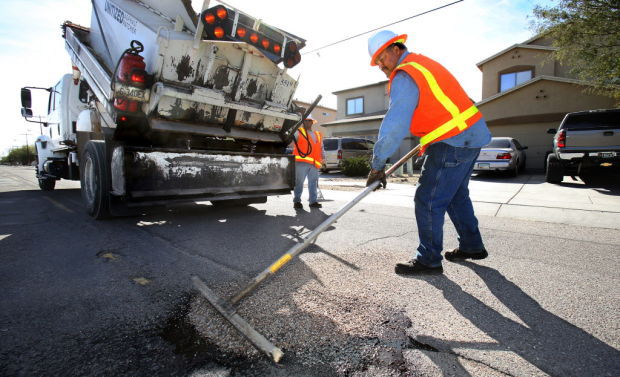PHOENIX — Unable to find the legislative votes for a statewide gas-tax increase, a Senate panel approved a package of alternate methods on Tuesday to raise money for road construction and repair.
One measure would impose a new series of fees and taxes on motor vehicles and is designed to raise about $120 million a year.
SB 1146 would replace the money that Gov. Doug Ducey plans to take from gasoline taxes and vehicle-registration fees to fund the state highway patrol. Sen. Bob Worsley, R-Mesa, said that siphons off dollars needed by the counties outside of Maricopa County to keep roads from deteriorating further.
Potentially more far reaching is SB 1147. It would give county supervisors the right to ask voters to impose their own dime-a-gallon tax on fuel and then to keep the revenues for local road needs.
The unanimous approval for both by the Senate Committee on Transportation and Technology came Tuesday, a week after a parallel House panel voted to put the question of a 10-cent fuel tax hike on the 2018 ballot. That measure, proposed by Rep. Noel Campbell, R-Prescott, stalled after Rep. Michelle Ugenti-Rita, R-Scottsdale, refused to give it a hearing in the House Ways and Means Committee she chairs.
“She said, ‘I don’t like it,’” Campbell said. Ugenti-Rita did not immediately return calls seeking comment.
Even if Campbell’s measure does go to voters, there’s no guarantee it would get approved. “We have a political environment, I think, in Arizona right now, where we’re just not going to get a statewide gas tax increase approved,” Worsley said.
One alternative, for now, is punting the issue to individual counties and their voters.
“If they feel some pressure that they need to relieve before this gets done as a state, this allows the counties to vote on up to a 10-cent increase,” Worsley said. The levy would last up to 20 years.
Scott Higginson, executive director of the Interstate 11 Coalition, said similar measures have been approved in Nevada and Utah, with proceeds earmarked for use only within specific counties.
He said Clark County, where Las Vegas is located, raised $720 million in the past three years. Some went to 400 local road projects, including street widenings and intersection improvements, while some is being reserved for Nevada’s portion of the proposed Interstate 11, which would run between Phoenix and Las Vegas.
“This is one way to go about raising additional funds,” Higginson said. And it leaves the decision with county officials “who know best where those dollars need and ought to be spent.”
SB 1146 is a bit more complex.
Owners of gas- and diesel-powered cars and trucks now pay an annual registration levy based on the value of the vehicle. This legislation would add one-half percent to the tax rate, which would compute out to about $150 a year for a $30,000 vehicle.
But owners of all-electric vehicles currently pay a different levy, about $12 for a $30,000 vehicle. Worsley, who owns a Tesla, pointed out that since they don’t need gasoline, they don’t pay the state’s 18-cent-a-gallon gas tax.
“It’s really not fair. I use the same roads,” Worsley said.
The legislation also contains an increase in registration fees for commercial vehicles and trailers.
Any move to raise more money for road construction is likely to face some opposition, including from Ducey.
“We’re not looking to raise taxes,” gubernatorial press aide Daniel Scarpinato repeated Tuesday.
He said Ducey is focused on other financial issues, including adding some dollars to K-12 education funding.





